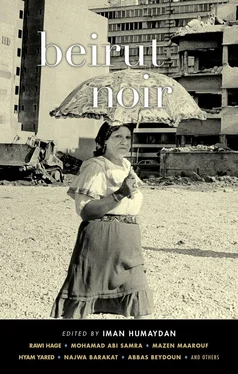As usual, the voice of the policeman stationed in front of the barrier outside of the Ministry of the Interior across from Sanayeh Park woke her from her thoughts. He was flirting with her like always: “Bonsoir, mademoiselle.” And as usual, she didn’t respond and kept walking toward Hamra while listening to him chat with his colleague. This cop’s behavior didn’t really bother her; in some ways it was reassuring. The idiotic repetition made her feel as though life goes on despite the war and state of emergency that were so alive in her head. She did wish, however, that she understood what kind of pleasure he felt when he spoke to her, because he seemed really satisfied with himself every time. Perhaps it was the simple pleasure of repetition and anticipation based on what’s come before — he knows that she won’t answer and she knows that he’ll always say the same thing. It’s like the pleasure we feel when we watch a scene in a film we’ve seen before... that prescribed feeling of simpleminded control, like we’re predicting something.
She stopped to listen to the sounds of the bombing; the rhythm had remained the same for the past two hours — strange how people can get used to any sound if they’re forced to. The southern suburbs, which had been bombed throughout the assault, were no more than quarter of an hour’s drive from where she was — but they seemed very far at the moment, like Khalid did. She remembered her first telephone conversation with him after he reached Canada. He told her about so many things that he’d seen: the strange man who’d stopped him in the train station to ask if he could spend the night at his place because space aliens had taken over his house; and the beauty of the snow that was falling that morning. But she wasn’t really paying attention to all this. She was listening to another sound, the little sound between the words, like that little silence between the bombs now falling on the southern suburbs.
They announce the number of deaths on the news but they won’t say how many were killed between one silence and another. Strange how in this specific moment she felt as though she really belonged to this country. Even stranger how Khalid’s leaving coincided with the beginning of the outbreak of the war. She slept that night wishing that the world would end and she woke the next morning and the world really was being destroyed. Since then she’d felt a strange guilt, as though she were making these things happen.
“Pssssssssssssssssst.” She’d arrived at the midway point on the way down to Abu Wadih’s bar when she heard a voice that she recognized right away. She was surprised — could it be the same man again?
“Psssssssssssssssssssst.” The second “pssst” left no doubt in her mind that this was the “pssst” she knew so well and was determined never to answer. But this one time only, she turned her head to confirm her doubts. Yes, it was the same man, the one who liked to flash her. He was always hidden in the same spot, behind some car, halfway down to Abu Wadih’s bar, waiting for any young woman to walk by so he could call out to her, “Psssssssssssssssssssst,” and as soon as she turned, he’d pull down his pants.
She turned back around quickly and kept walking, drowning in laughter. She didn’t expect to see him that evening, but it seemed that even war could not prevent this man from continuing his incomprehensible habit of showing his penis to passersby.
She remembered Myriam’s hysterical reaction when she was with her and the man “pssstpssst” -ed the two of them, exposing himself as usual. She didn’t know why this guy didn’t frighten but, rather, amused her. Perhaps madness is a more appropriate reaction to life; rational people are the ones who frighten her the most, like Khalid with his well-mannered upbringing. She’d never seen him do anything wrong or behave in an improper way; even when he was drinking, he’d stay completely in control of his social consciousness. Honestly, only when he was drunk was he like her when she was fully alert.
She arrived at Abu Wadih’s and the place was empty except for the bartender, Alaa, and one other customer, a hunchbacked man sitting at the side of the bar. For some reason this customer made her feel really nosy — she wasn’t able to tell if he was actually hunchbacked or if it was just how he was sitting. He seemed very heavy in his body, as if at any second he might fall on the table or into his glass. She remembered the strange conversation that she and Khalid once had about Kundera’s The Unbearable Lightness of Being , the very first time they met, and how he burst out laughing when she told him her interpretation of the stations of people’s sadness and their meanings, according to the law of gravity. There’s no doubt that gravity affects some people more than others, and because of this they continually experience feelings of heaviness that they associate with sadness and grief, while gravity weighs lighter on others and then they are lighter, and therefore happier, than the rest. The two of them had this conversation sitting at the table she’d passed by a moment ago. She ran her hand slowly over the wooden table as if to confirm it was still sturdy. Often when pain accosted her she liked to touch the things around her. For a while, whenever she woke up in the morning and was seized by the bitter awareness that Khalid had left, she’d place her hand against the cold wall and leave it there for a while. For some reason this reassured her.
She ordered an Almaza beer and went to sit by herself at a small table at the end of the room. She didn’t recall ever sitting at this table with Khalid. She didn’t usually like to sit in the corner; she hated looking at the wall. But since Khalid had gone, she felt that her relationship with walls had improved.
The day before she’d had a strange dream. Its protagonist was a sofa. The sofa was inside a house, she didn’t know where. She saw a gray sofa at the end of a living room and believed that it was the same one in pictures of her old childhood home. She rushed into the sitting room, searching for a mirror to examine herself in, and the gray sofa took her back to the distant past before her parents separated, when her father moved with her brother to another city. After they left, her mother bought a new sofa because her father had taken the gray one with him to his new house.
In the logic of the dream, finding the sofa meant that she’d returned to her childhood. But she didn’t find a mirror in the sitting room. She was disappointed; she’d really longed to see her face as a girl. She went back to the living room again and couldn’t find the gray sofa either. In its place, there was a black leather sofa. She recognized it right away and was overcome by annoyance. This sofa was from Khalid’s old living room. She walked over to it cautiously, touched it, and her hand felt something damp, like sweat. She tried to pull her hand away but it was stuck on the leather. She started wriggling it around to separate her skin from the leather, but it was no use and she started screaming.
She woke up, her neck wet with sweat, her hair stuck to it, and felt the same irritation she’d felt in her dream when touching the sofa. While recalling the dream, she wondered why her father chose to take the gray sofa but nothing else. The only time she cried after her parents separated was the day when she woke up in the morning, went into the living room, and didn’t find the sofa there. She sat on the ground in the empty spot where it had been, leaned her head into her hands, and burst into tears. When her mother saw her, she didn’t ask why she was crying, but simply sat down next to her, tears flowing from her eyes too. They didn’t talk about it, but the following morning her mother bought a new sofa with all of the colors known to the world — and those unknown up until then too. Visitors gave them strange looks when they glimpsed their unusual sofa. But she and her mother were really happy with their beautiful, colorful sofa, which didn’t remind them of anything at all. It was just completely amazing.
Читать дальше












